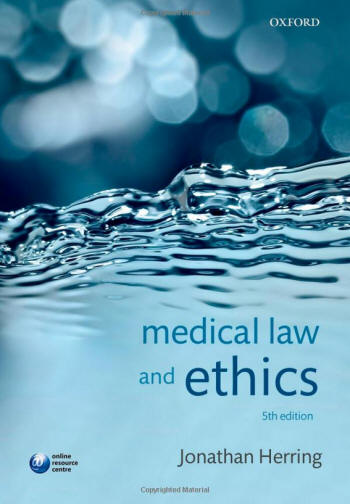Book Review
Medical Law and Ethics
Jonathan Herring
Oxford University Press
ISBN:
978-0198702269
 This
is an extremely well written and interesting presentation of the subject
of medical law and ethics. The author covers all the major areas: consent,
confidentiality, abortion, euthanasia, mental health etc.
This
is an extremely well written and interesting presentation of the subject
of medical law and ethics. The author covers all the major areas: consent,
confidentiality, abortion, euthanasia, mental health etc.
For the purposes of this review, I will examine the controversial topics of abortion and euthanasia. The author presents the case for and against them in a fair and balanced way. On abortion, the author argues that while English law does not recognize a woman's right to abortion, in practice the law operates as if there is such a right. At least in the first three months of pregnancy, a woman who wants an abortion will get one. Much is made in the media about doctors who attempt to dissuade women from proceeding with an abortion. The author notes that many women complain about being put under pressure to have an abortion by doctors. While some women complain that they are over-counselled by professionals, others say that they were not given enough time to make the decision.
The author notes that some believe the foetus to be a person from conception. He quotes the gifted pro-life philosopher Christopher Kaczor as saying that a human being ought to be granted inherent moral worth by virtue of the kind of being it is. Compare that with Peter Singer's view that infants with severe disabilities ought not be granted personhood and can be subject to infanticide. As Kaczor notes, if you don't grant personhood at conception, you will end up with all sorts of opinions including those of Singer's. Some grant personhood when there is viability outside the womb. But viability improves with medical progress. Does this mean that personhood depends on medical progress?
What about the observation that a number of early embryos will die naturally? One may argue that those who do not respect human embryos for this reason are like those who do not respect infants in countries with high rates of infant mortality.
The author examines Judith Jarvis Thomson's famous violinist argument in favour of abortion and raises solid arguments against the analogy as proposed by Marquis and Kaczor. Ethical issues of abortion in sex selection and disability are also examined.
On euthanasia, the author makes a clear distinction between vitalism and sanctity of life, a distinction that is often ignored. The sanctity of life principle accepts that an act that shortens the life of a patient for good, clinical reasons can be accepted. It is also permissible to withdraw treatments that are futile. In contrast, the quality of life principle accepts the very different idea of a futile existence.
In summary, the book is both well written and balanced. An inspiring read even when at times one does not agree with the author.
REVIEWED BY DR PRAVIN THEVATHASAN
